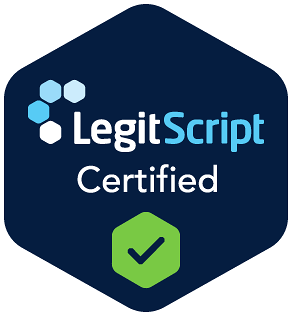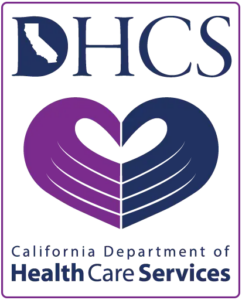Substance abuse affects millions of Americans, but recovery is possible with the right support and treatment approach.
Finding quality substance abuse treatment near me can feel overwhelming when you’re ready to take that first step toward healing.
We at Surf City Detox understand this challenge and want to guide you through your options, from medical detox to long-term recovery planning.
Which Treatment Options Work Best for Substance Abuse Recovery
Medical detox serves as the foundation of effective substance abuse treatment and provides 24/7 medical supervision during withdrawal. Statistics show that 38.6% of illegal drug users meet criteria for a drug use disorder, which makes professional medical support essential for safe withdrawal management. Medical teams monitor vital signs, manage symptoms, and prevent complications that can arise during detox from alcohol, opioids, or benzodiazepines.
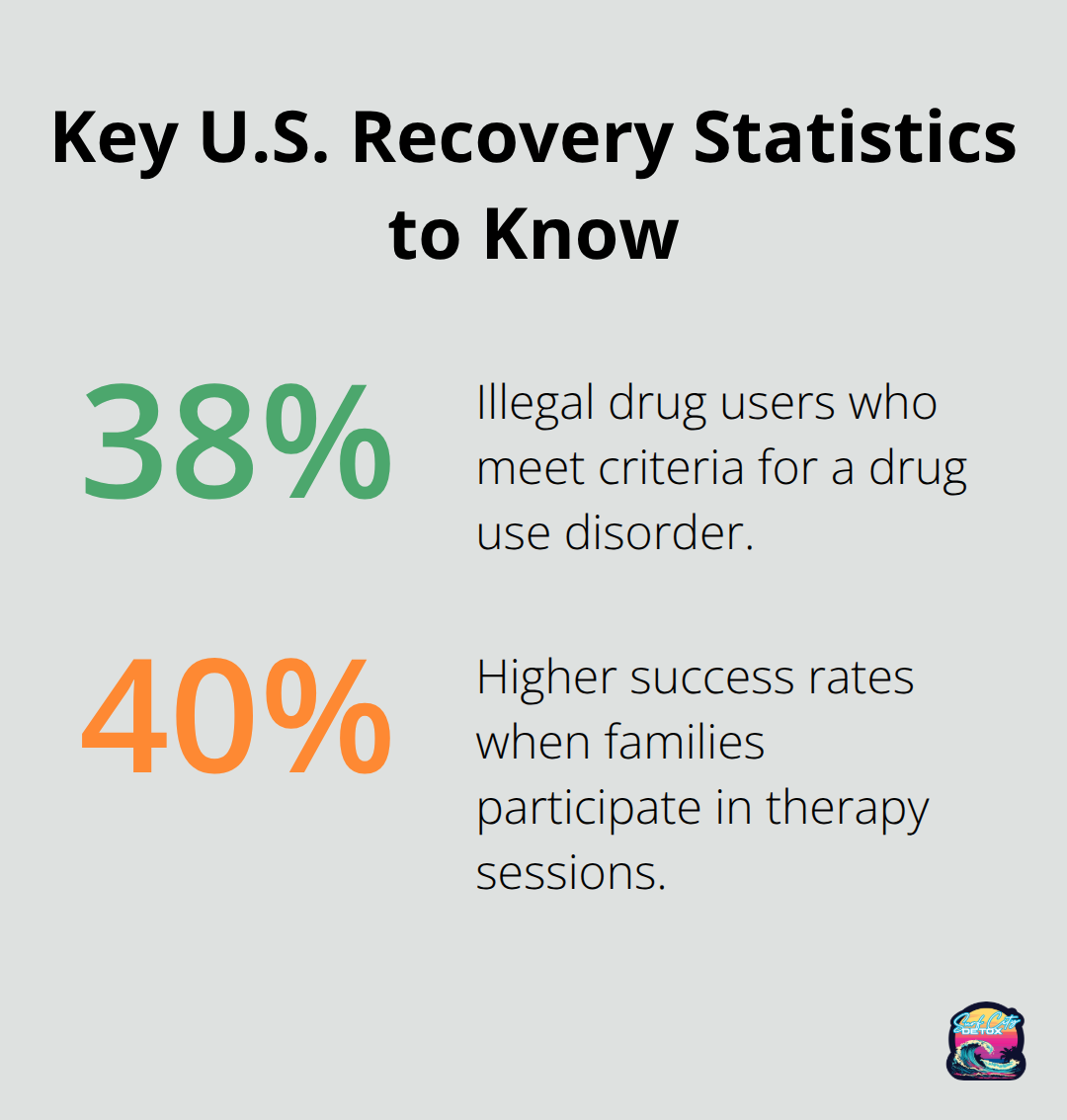
Residential Treatment Programs Create Structured Recovery Environments
Residential programs offer the most comprehensive approach to addiction treatment, with clients who live on-site for 30 to 90 days. These programs address the root causes of addiction through individual therapy, group sessions, and family counseling. Research indicates that individuals who complete residential treatment have significantly higher success rates than those who attempt recovery without professional support. The structured environment removes triggers and provides constant access to clinical staff who can adjust treatment plans based on progress.
Dual Diagnosis Treatment Targets Mental Health and Addiction Together
Dual diagnosis care treats addiction and mental health disorders simultaneously, which proves vital since 21.5 million adults in the United States have co-occurring conditions. Programs that integrate treatment for depression, anxiety, PTSD, and substance abuse show better outcomes than treating these conditions separately. Cognitive Behavioral Therapy and Dialectical Behavior Therapy are evidence-based approaches that help clients develop coping strategies for both addiction and mental health symptoms.
Outpatient Programs Support Flexible Recovery Paths
Outpatient treatment allows individuals to maintain work and family responsibilities while receiving professional support. These programs typically involve counseling sessions several times per week and group therapy meetings. The flexibility makes outpatient care accessible to those who cannot commit to residential treatment but still need structured support to maintain sobriety.
When you evaluate these treatment options, consider your specific needs and the severity of your addiction to determine which approach will provide the strongest foundation for your recovery journey.
How Do You Choose the Right Treatment Center
Accreditation stands as the most important factor when you evaluate treatment facilities, with The Joint Commission and state licensing providing the strongest indicators of quality care. Facilities without proper credentials lack oversight and may compromise your safety during withdrawal or treatment. Location matters significantly for your recovery success – treatment centers within driving distance of family support systems show better long-term outcomes, while those too close to former drug connections can trigger relapse. Staff credentials separate professional facilities from inadequate programs, so verify that medical directors hold board certification in addiction medicine and therapists possess proper licensing in substance abuse counseling.
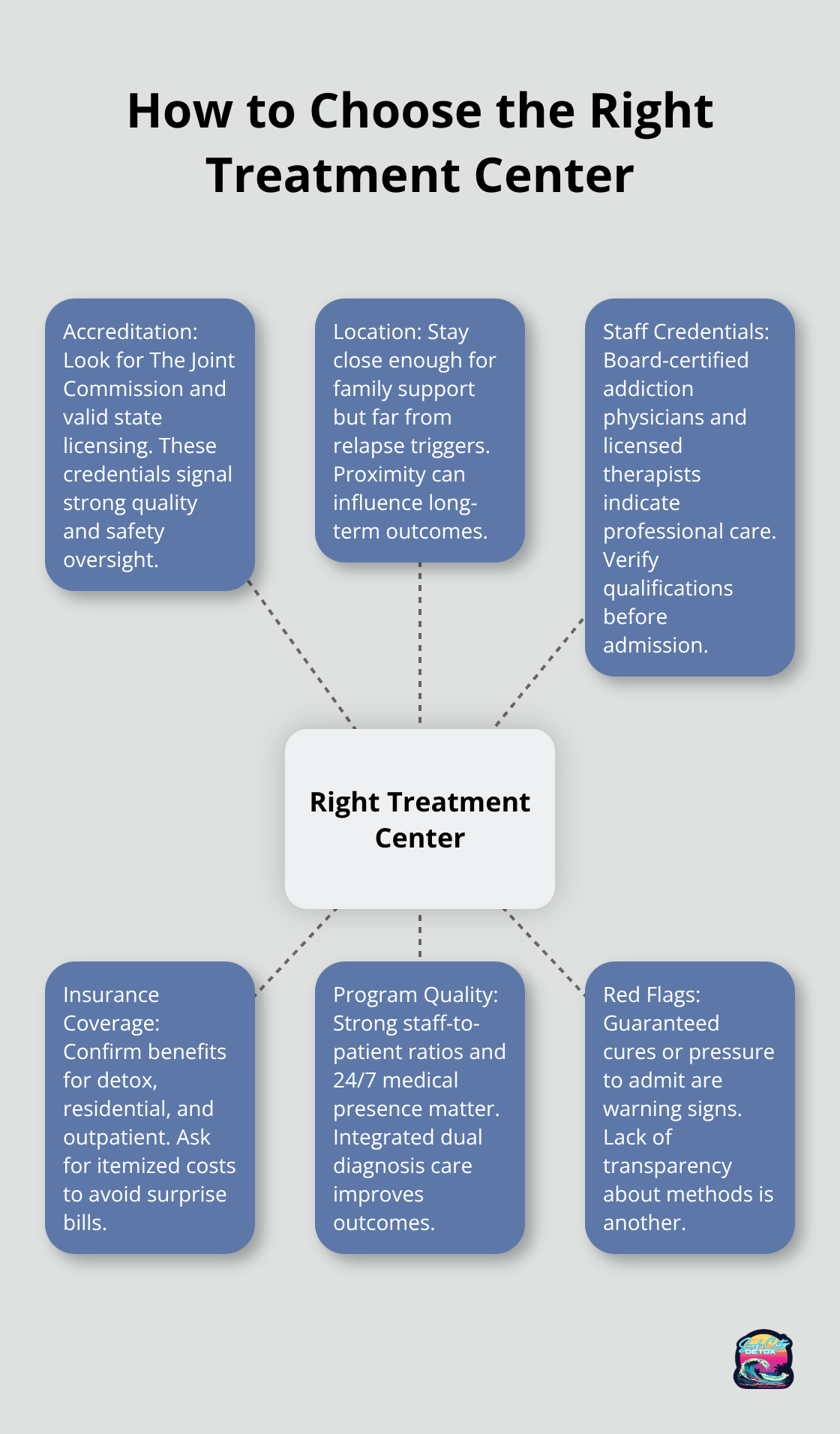
Insurance Coverage Determines Your Treatment Options
Most insurance plans cover substance abuse treatment under the Mental Health Parity Act, but coverage varies dramatically between providers and specific programs. Contact your insurance company directly to verify coverage percentages for detox, residential treatment, and outpatient care – many people face unexpected bills because they relied on facility estimates rather than confirmed benefits. Ask treatment centers for detailed cost breakdowns including medical services, therapy sessions, and additional fees that insurance might not cover. Payment plans and sliding scale options exist at many facilities (making treatment accessible even with limited coverage or high deductibles).
Essential Questions Reveal Program Quality
Ask specific questions about staff-to-patient ratios during your facility search – quality programs maintain ratios of one clinical staff member for every four to six clients. Request information about their medical detox protocols and whether physicians remain on-site 24/7, as complications during withdrawal require immediate medical intervention. Inquire about their dual diagnosis capabilities and whether they treat your specific mental health concerns alongside addiction, since 21.5 million adults have co-occurring conditions that require integrated treatment approaches.
Red Flags That Signal Poor Treatment Quality
Watch for facilities that promise quick fixes or guarantee specific outcomes (legitimate programs acknowledge that recovery timelines vary by individual). Avoid centers that pressure you into immediate admission without proper assessment or refuse to provide detailed information about their treatment methods. Programs that separate addiction and mental health treatment completely miss the connection between these conditions and reduce your chances of lasting recovery.
Once you identify quality treatment options that meet your needs and budget, the next step involves understanding what your daily experience will look like during treatment.
What Happens During Your First Week of Treatment
Your treatment journey begins with a comprehensive assessment that takes 2-3 hours and examines your substance use history, mental health symptoms, medical conditions, and family dynamics. Clinical teams use standardized tools like the Addiction Severity Index to measure treatment needs across seven life areas (employment, family relationships, and psychological status). This assessment determines your personalized treatment plan, medication needs, and therapy approaches – facilities that skip thorough assessments often miss co-occurring disorders that affect 21.5 million adults with substance abuse issues.
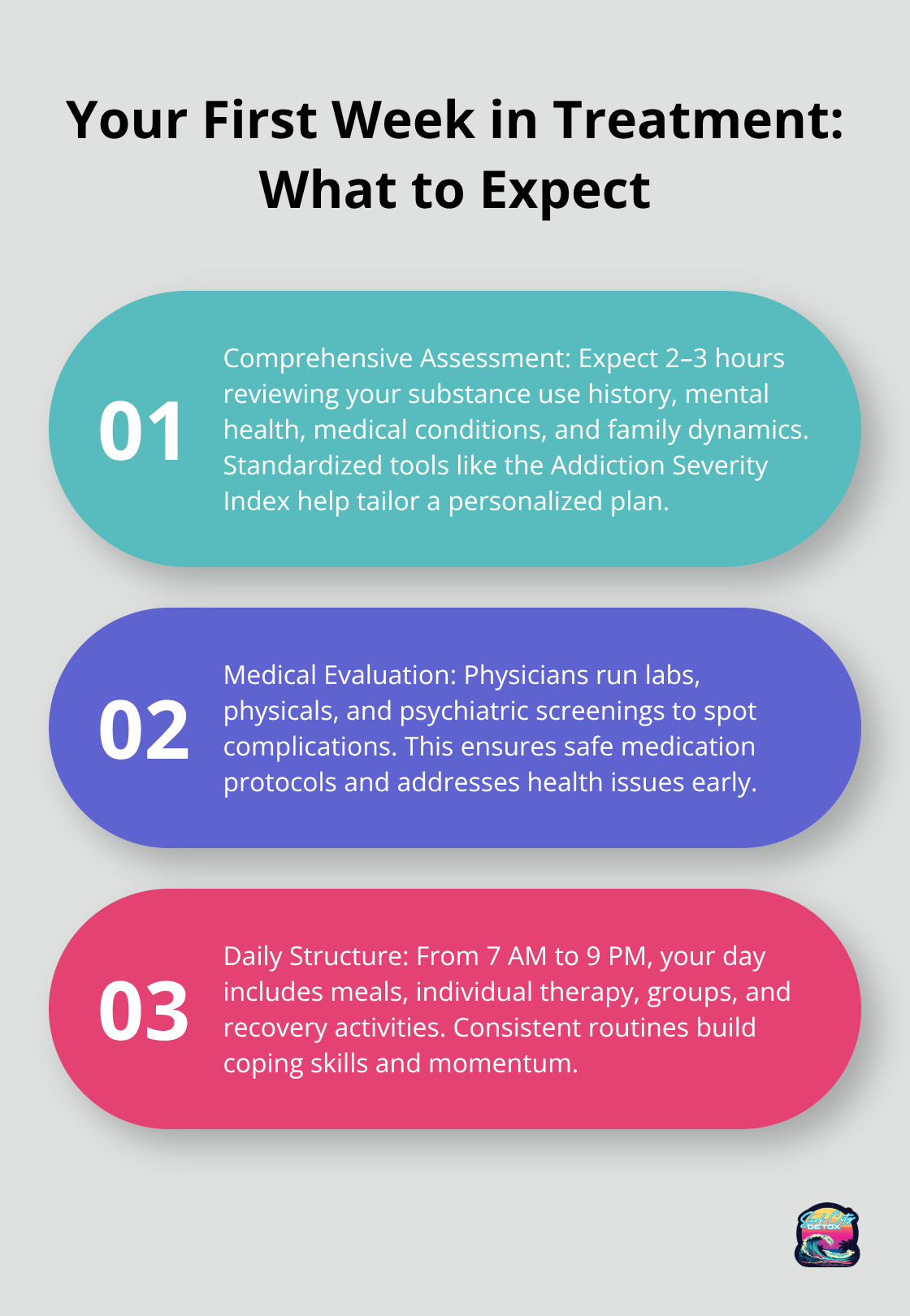
Medical Evaluation Sets Your Treatment Foundation
Medical staff conduct lab work, physical exams, and psychiatric evaluations to identify any health conditions that could complicate your recovery process. Physicians check for liver damage from alcohol abuse, heart problems from stimulant use, and respiratory issues from opioid addiction. Mental health professionals screen for depression and addiction, anxiety, PTSD, and other conditions that require integrated treatment approaches. This medical foundation allows treatment teams to create safe medication protocols and address physical complications before they become serious problems.
Daily Structure Provides Stability and Progress
Treatment programs typically run from 7 AM to 9 PM with scheduled meals, individual therapy sessions, group meetings, and recreational activities that rebuild healthy routines. Individual therapy sessions occur 2-3 times per week and focus on identification of triggers, development of coping strategies, and processing of trauma that often underlies addiction. Group therapy happens daily and connects you with peers who face similar challenges – research shows that peer support significantly improves long-term sobriety rates.
Educational Sessions Build Recovery Knowledge
Most programs include educational sessions about addiction science, relapse prevention, and life skills that prepare you for independent living after discharge. These sessions teach you how addiction changes brain chemistry, why certain situations trigger cravings, and how to recognize early warning signs of relapse. Life skills workshops cover practical topics like job interview preparation, financial management, and healthy relationship boundaries that support long-term recovery success.
Family Programs Rebuild Damaged Relationships
Family involvement dramatically improves treatment outcomes, with studies that show 40% higher success rates when families participate in therapy sessions. Most quality programs offer weekly family therapy sessions, educational workshops for loved ones, and communication skills that address trust issues and codependency patterns that addiction creates. Family members learn about addiction as a brain disease, how to set healthy boundaries, and ways to support recovery without enablement of destructive behaviors.
Final Thoughts
Recovery requires courage, but you don’t have to face this journey alone. The statistics show that 38.6% of illegal drug users meet criteria for a substance use disorder, yet only 12.8 million out of 54.2 million people who need treatment actually receive it. This treatment gap makes quality substance abuse treatment near me even more valuable when you’re ready to change your life.
Recovery success depends on consistent participation in evidence-based treatment approaches and ongoing support systems. Research shows that individuals who complete comprehensive treatment programs have significantly higher long-term sobriety rates than those who attempt recovery without professional help. Strong coping strategies, trauma resolution, and healthy relationships form the foundation of lasting recovery.
We at Surf City Detox provide the integrated care you need to overcome addiction and rebuild your life. Our comprehensive treatment programs combine medical detox, residential treatment, and dual diagnosis care in our Huntington Beach location (with 24/7 medical support and individualized treatment plans). Contact us today to learn how our compassionate team can support your path to lasting sobriety and wellness.

